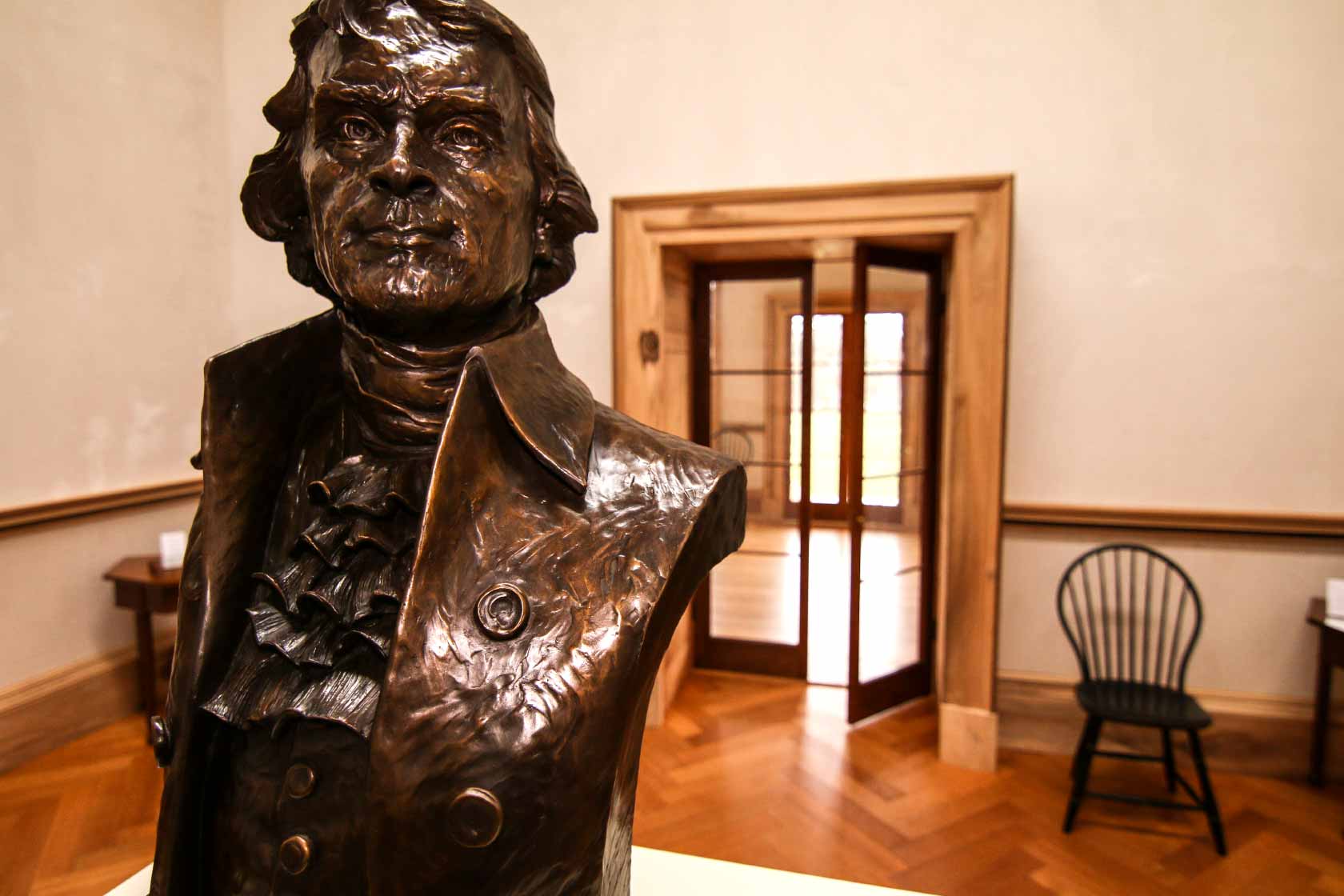Upcoming Events
Mr. Jefferson’s Salon Series: Race and Democracy
September 26, 2019 from 6:30 pm - 8:30 pm

- This event has passed.
Mr. Jefferson’s Salon Series: Race and Democracy
September 26, 2019 from 6:30 pm - 8:30 pm

A Conversation on Race and Democracy
Jefferson wrote the immortal words of the Declaration of Independence that have inspired people throughout the world to work for democracy. He also enslaved black men, women and children throughout his life and was convinced that when the enslaved were finally emancipated, blacks and whites could never live together. Nearly 200 years after Jefferson’s death, how has the legacy of racial slavery shaped our democracy?
Join Dr. Ibram X. Kendi, Dr. David Blight, Dr. Martha S. Jones, Dr. Peter Onuf and our moderator, Dr. Edward L. Ayers, for a conversation addressing this continually relevant question, during Mr. Jefferson’s Salon Series at the Historic Academy Theatre in downtown Lynchburg, on Thursday, September 26, from 6:30 to 8:30 p.m.
Tickets include a post-salon reception with light hors d’oeuvres and a cash bar: $32 for adults (18+); $16 for teens 17 and under and college students with student ID; reservations are suggested. For more information and to purchase tickets, visit academycenter.org or call the Academy Center of the Arts Box Office at 434.846.8499.
About the Speakers
Dr. Ibram X. Kendi
A professor of history and international relations, Dr. Ibram X. Kendi is the founding director of the Antiracist Research & Policy Center at American University. His books include Stamped from the Beginning: The Definitive History of Racist Ideas in America, which won the 2016 National Book Award for Nonfiction, and the recently-published How to be an Antiracist.
Dr. David Blight
Dr. David Blight is the Sterling Professor of History, African American Studies, and the director of the Gilder Lehrman Center for the Study of Slavery, Resistance and Abolition at Yale University in New Haven, Connecticut. In 2019, Dr. Blight became the recipient of the Pulitzer Prize for History for his latest book, Frederick Douglass: Prophet of Freedom.
Dr. Martha S. Jones
Dr. Martha S. Jones is the Society of Black Alumni Presidential Professor and a professor of history at Johns Hopkins University in Baltimore, Maryland. She is the author of Birthright Citizens: A History of Race and Rights in Antebellum America and her latest book, Vanguard: A History of African American Women’s Politics, is to be published in 2020.
Dr. Peter Onuf
The Thomas Jefferson Memorial Foundation Professor, emeritus, at the University of Virginia, Dr. Peter Onuf is also a Senior Fellow at Monticello’s Robert H. Smith International Center for Jefferson Studies. He is a leading scholar of Jefferson and the early American republic, the author of numerous books, including The Mind of Thomas Jefferson, and the co-author of “Most Blessed of the Patriarchs”: Thomas Jefferson and the Empire of the Imagination.
Dr. Edward L. Ayers, Moderator
Dr. Edward L. Ayres, the moderator for the evening, is the Tucker-Boatwright Professor of the Humanities and president emeritus at the University of Richmond. Dr. Ayers has been named National Professor of the Year and won the Bancroft Prize for distinguished writing in American history. His newest book, The Thin Light of Freedom: The Civil War and Emancipation in the Heart of America, won the Lincoln Prize for best non-fiction historical work on the American Civil War in 2018.
Join us for this special event at Lynchburg’s Historic Academy Theatre.
Get TicketsAn American Evolution Event
“Race and Democracy” is supported by American Evolution™, 2019 Commemoration. American Evolution marks the 400th anniversary of several key historical events that occurred in Virginia in 1619 that continue to influence America today, including the arrival of the first recorded Africans to English North America. Featured events, programs and legacy projects inspire local, national and international engagement in the themes of democracy, diversity and opportunity.
About Mr. Jefferson’s Salon Series
The Salon Series was developed to offer a place for people to discuss their differences of opinion in an open and civil way, and to help to come to an understanding about the issues our nation faces today. Poplar Forest patterned the Salon Series on the 18th-century Enlightenment salons—fostering discussion and debate on topics ranging from politics, to art and literature, to science, philosophy and morality—that Jefferson himself attended while serving as American ambassador to France, and are designed to encourage an exchange of ideas on issues that were of interest or a challenge to Jefferson in his time, and why they continue to matter today.
About the Historic Academy Theatre
The Historic Academy Theatre is one of Lynchburg’s most notable historic treasures. First opened on February 1, 1905, the theatre boasted perfect sightlines and extraordinary acoustics, attracting nationally acclaimed performing artists. After closing its doors in 1958, the theatre remained unused for 60 years. Through the efforts of the Academy Center of the Arts’ board and staff, as well as the dedicated members of the community, the restorations of the historic theatre were brought to completion and the theatre was reopened on December 6, 2018.